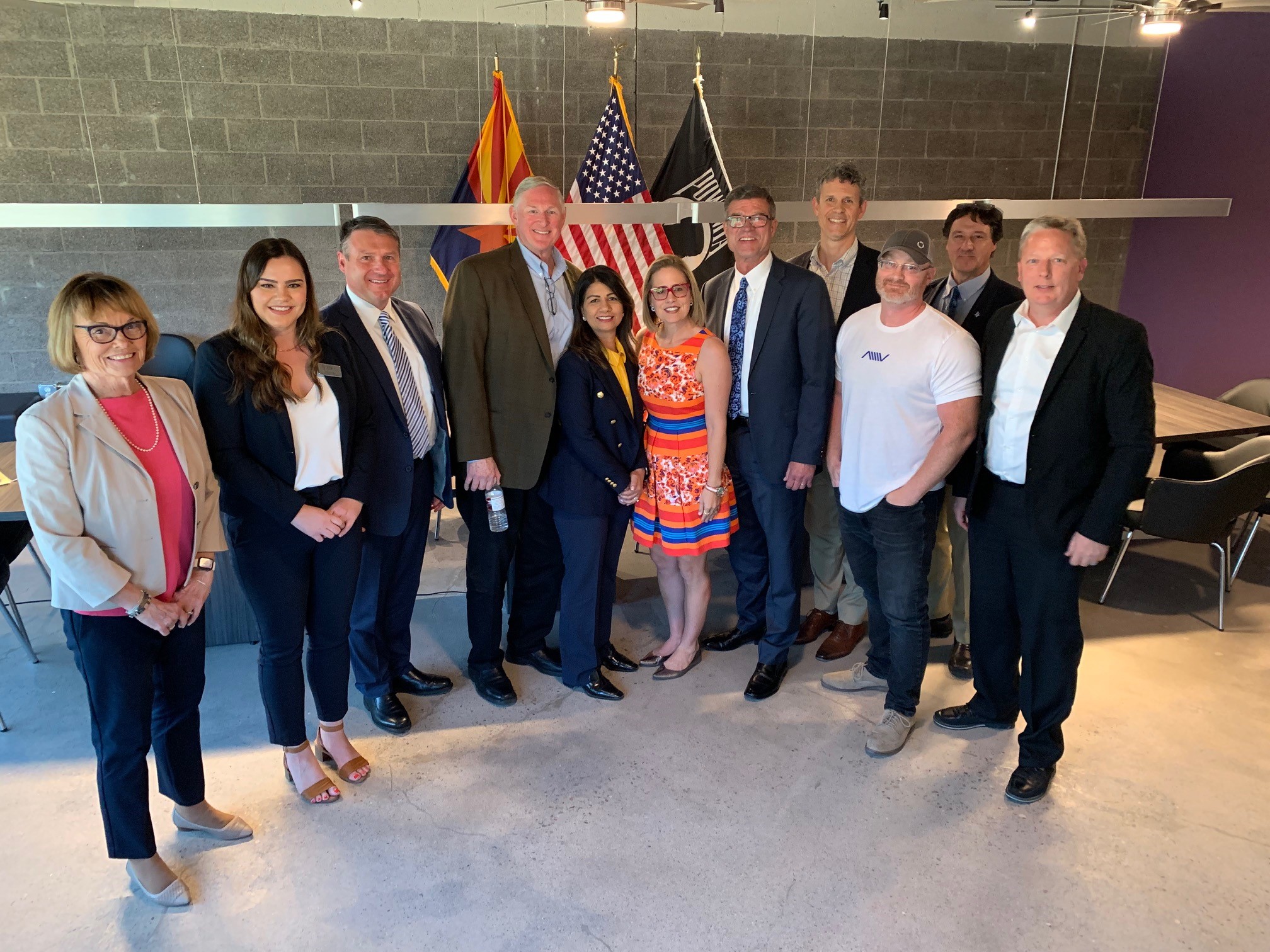Sen. Sinema meets with Arizona Technology Council and local technology leaders to discuss historic clean-energy investments

By: Bianca Buliga, Director of Marketing & Communications, Arizona Technology Council
Over the past several years, Arizona has steadily proven its ability to lead the nation in developing clean-energy technologies that benefit the state’s economy.
KORE Power just finalized the purchase of 214 acres in Buckeye that will become home to the KOREPlex, a two million square foot manufacturing facility that will have the capacity to produce 12 GWh of lithium-ion battery cells annually, bringing thousands of jobs to the Valley of the Sun.
Earlier this year, Lucid Motors struck a deal with Saudi Arabia for the purchase of up to 100,000 vehicles over 10 years – an agreement likely catapulted by MotorTrend naming the Lucid Air its 2022 ‘Car of the Year.’
Mobility technology company Atlis Motor Vehicles recently announced its plans to submit an S-1 format Form 1-A and Nasdaq Global Market application in anticipation of a public listing on the stock market. And these big wins do not even include other local clean-energy leaders like ElectraMeccanica, Nikola Motors and Zero Electric Vehicles.
Despite this laudable growing leadership, our work must accelerate. Arizona must continue to move its economy away from volatile foreign fossil fuels and deepen its usage of clean-energy sources like solar, hydrogen and wind.
On Friday, May 13, the Arizona Technology Council led an in-person clean-energy business roundtable at Senator Kyrsten Sinema’s office in central Phoenix. Attended by high-level executives from Atlis Motor Vehicles, Bosch-Rexroth, ElectraMeccanica, KORE Power, Lucid Motors, Nikola Motors and Zero Electric Vehicles, this roundtable was organized to request Senator Sinema’s leadership on historic clean-energy investments either as standalone legislation or as part of the Budget/Reconciliation process.

In the wake of the global energy crisis being exacerbated by current events, the investments would include:
- Clean-energy tax credits for electric transmission
- Incentives and investments in domestic clean-energy supply chains, advanced manufacturing and government procurement
- Electric vehicle and charging infrastructure tax credits
- Residential solar and energy efficiency incentives and investments
- Dedicated funding for high-speed rail to build the necessary rail lines across the West for our growing cities
- Rural development and resiliency investments in climate-smart agriculture and forestry
By prioritizing these investments, Arizona stands to gain more than 69,837 high-paying jobs over the next five years, contributing $4.5 billion to the state’s GDP. This would also translate to saving the average Arizona household $500 a year, resulting in a grand total of $449 million from reduced electric bills for Arizona businesses and families.
As KORE Power COO Seema Phull mentioned during the roundtable, additional funding would also help Arizona establish an independent and circular supply chain that “serves our country first.” This is why KORE is focused on creating the KOREPlex facility and innovation center that is working to identify gaps in the supply chain, more efficiently recycle waste, reduce prices and build a lithium-ion battery manufacturing cluster within Arizona.
One key beneficiary of this local battery ecosystem is Nikola, whose manufacturing facility in Coolidge currently employs 1,000 employees. During the roundtable, Nikola Chief Legal Officer Britton Worthen claimed that the largest contributor to greenhouse gases is the transportation industry, more specifically passenger vehicles and medium- and heavy-duty vehicles. By creating a vehicle tax credit for battery-powered medium- and heavy-duty trucks, Arizona leadership can lead the way in investing in fleets that use alternative energy sources and alleviating a key contributor to greenhouse gas emissions.
Finally, several of the roundtable’s attendees emphasized the importance of using investments to repair Arizona’s aging infrastructure. Michael Boike, head of Arizona operations and senior director of manufacturing at Lucid Motors, highlighted that Arizona needs to prepare for an impending water shortage. Mark Hanchett, CEO of Atlis Motor Vehicles, mentioned the need to replace old, high-polluting diesel school buses with cleaner models. And Jim Maury, co-founder and president of Zero Electric Vehicles, illuminated the need for Arizona utility companies to critically examine how they will support charging infrastructure for electric vehicles at the consumer and commercial levels.
Between its wealth of natural resources (including endless sunshine), its talented pool of skilled workers and its burgeoning clean-energy ecosystem, Arizona can truly become a national leader in advancing climate action. We feel confident that Senator Sinema’s meeting with local clean-energy leaders will help lead to a historic bipartisan investment package that will accelerate Arizona’s transition to clean energy for decades to come.
